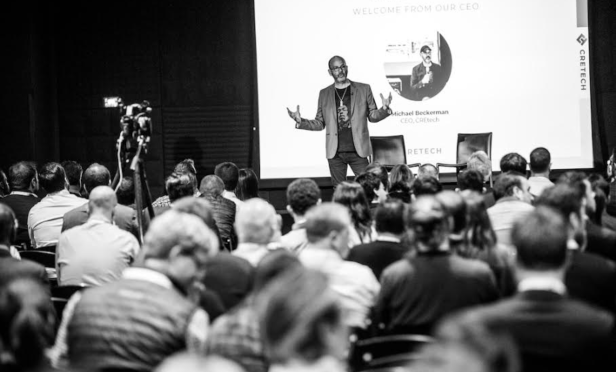Smart living is rapidly coming to multifamily properties, and landlords need to prepare. Owners should be asking what products are essential, which products drive occupancy and rents and understand the maintenance of technology products in the home. Some of the largest apartment owners in the country sat down at RealShare Apartments in Los Angeles to talk about how they are approaching technology in apartment living on the Landlords Leading The Way In Multifamily Tech panel, moderated by Michael Beckerman, CEO of CREtech, and with speakers Louis Schotsky, VP at Equity Residential; Peter Chmielewski, SVP of development at LMC; David Seiler, VP at Trinity Property Consultants; and Scott Wesson, SVP and chief information officer at UDR.
One of the biggest challenges in real estate companies adopting technology is simply that the industry isn't a technology industry, which means that companies need to look externally for both tech products and tech information. Schotsky said that Equity Residential did just that when they began exploring and integrating technology into the space, particularly, the company began investing into real estate tech funds. This became a common theme among the panelist to both look for products and seek information outside of the real estate industry. “We remind ourselves that we are a real estate company not a tech start up, so we look at how the technology enhances that,” added Seiler.
This was true as well when it came to maintaining the technology as well. LMC has been one of the pioneers of implementing technology into the multifamily space with its Chicago project Marlow, which is fully outfitted with smart home products, from an Amazon Alexa to smart lighting to smart thermostats. Chmielewski says that the company studied hundreds of different implementations, really through trial and error, before landing on the final suite it installed in Marlowe. “We wanted to make sure that we had a suite of products that served our tenants the best,” he said. “We also don't have the expertise to manage those technologies. We have gotten great feedback, and it has been well received.”
Wesson added that getting a tech partner is essential to the trial-and-error process and in maintaining and future proofing the technology. “Get a tech partner,” he said. Have someone that spends more time on it than you can.” He added that owners should also be allotting time to technology integration, explaining that the firm didn't see any real movement unit they spent time on it every month.
Equity Residential and UDR were a little too early in looking at smart home technologies, before they were really ready for easy consumer use in the market. Schotsky said the firm looked into the opportunity five years ago, but there was no common platform and it was too difficult to manage. Wesson had a similar experience, saying that there was no commonality in the products years ago. Today, that has changed, and the firms are circling back to smart home products.
Smart home technologies are still seen as new and as a luxury product, and as a result, many renters will opt out of paying for them a la carte. For example, if you offer smart home as a package, say for $100 per month, renters won't use it. However, if you offer a fully equipped smart apartment unit at $3,100 per month, instead of $3,000, prospective renters are more accepting of the premium rent. However, there is an issue in translating the premium during the marketing process. Wesson said that there is no smart-feature option on apartment search engines, and often renters can't tell why there is a premium on one unit when they are looking at them side-by-side online.
While smart features are already landing inside apartment units, Schotsky said that the bigger benefit will be technologies that enhance the transaction process. “I think valuation and transaction will be the most transformative to our industry,” he said. “Today the data isn't great, but they are going to figure that out. I think that it will change how we do transactions.”
© Touchpoint Markets, All Rights Reserved. Request academic re-use from www.copyright.com. All other uses, submit a request to [email protected]. For more inforrmation visit Asset & Logo Licensing.







